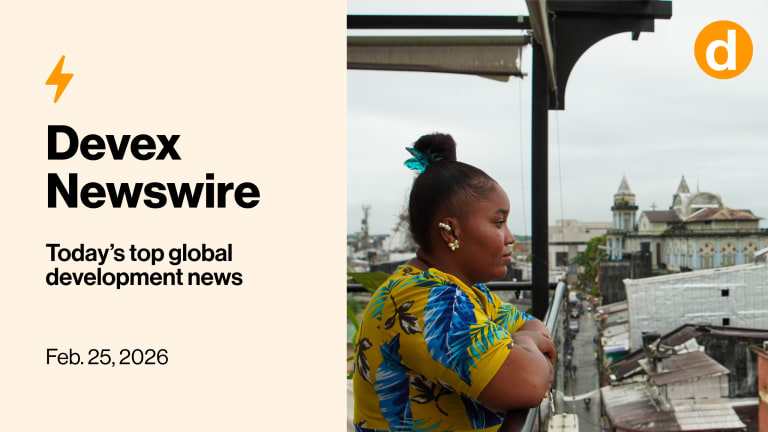Cash transfers debate in Colombia complicates Venezuela response
NGOs and the U.N. are eager to use cash transfers in the humanitarian response to the Venezuela crisis, but the Colombian government has misgivings.
BOGOTÁ, Colombia — Humanitarian cash transfers are becoming more accepted within the humanitarian response community as both a more efficient and dignified way to meet basic needs including food and shelter for migrants and refugees. But opting for cash transfers over an in-kind donation for humanitarian assistance to Venezuelans in Colombia has met challenges from a government that continues to struggle to meet the needs of its own people, NGO leaders told Devex. “All the major donors are very interested in seeing that cash should be one of the main strategies.” --— Christian Visnes, Latin America regional director, Norwegian Refugee Council The Colombian government is wary of demonstrating preferential treatment for Venezuelans over its own citizens, where 27% of the population live below the national poverty line and resources in many host communities are increasingly strained by the over 1 million Venezuelans currently living in Colombia. While the government has been lauded by the international community for its generosity to those leaving the country, the perception that Colombia is prioritizing Venezuelans could contribute to rising xenophobia. Humanitarian actors, organized into a cash transfer coordination group, have been working with the government to overcome these concerns and to lobby for more robust cash transfer programming. NGOs and U.N. representatives set a minimum expenditure basket — what a household requires in order to meet basic needs — for the country, which includes allocations for things such as food, hygiene, transportation, communication, and education and are then added together to determine the total transfer value. But the Colombian government declined to accept the recommended numbers for the minimum expenditure basket, instead setting its own figures. Charlie Rapoport is the Collaborative Cash Delivery manager for Colombia, working to coordinate the 15 NGO group around quality cash programming. He said that the group has “a fantastic opportunity to work with the government,” but he also acknowledged that “the first discussion was tense.” The government wanted to set the amount low so that when NGOs are no longer around, the level remains sustainable, he said. This is partially why the amount selected by the government is lower than the poverty line and “way below” recommended standards. “It was not really a subject for discussion, it was just being enforced … ‘This is the transfer value. No more discussions,’” Rapoport said. “But I think we have to respect that. They’re very valid points.” The current amount set by the government is 126,250 Colombian pesos for one person per month — about $40 — while the cash working group set the minimum expenditure basket at 377,983 — about $140. Informally, the group agreed that the amounts allowed for cash transfers will be renegotiated with the government after six months and in the meantime, NGOs are considering how the smaller monthly amounts may allow them to reach more people or provide benefits for a longer period of time. Why implement cash? The government is influenced in part by its past experience with cash transfers, said Provash Budden, Americas director for Mercy Corps. Colombia used the modality to mixed success as a part of its victims’ unit, which addresses impacts of the country’s decades-long conflict. He said that NGOs need to be able to present evidence to the government that cash transfers are effective and flexible. “It’s an iterative process … We know that the market is also quite different between Venezuelans here in Bogotá and the ones sitting out in Maicao,” Budden said, referencing a city in the northern department of La Guajira that borders Venezuela. “The cost of goods and services are different, so the baskets also need to be adjusted to reflect those market realities.” Colombia provides a ripe financial and regulatory environment for successful implementation of cash transfer programming, which is not always the case in crisis situations where humanitarian organizations would prefer to use cash over traditional in-kind food and housing. Donors also prefer cash transfers, said Christian Visnes, Latin America regional director at the Norwegian Refugee Council. “Some of the beneficiaries that we work with are taking some of their cash and investing it in small businesses. That’s part of Colombia’s overall vision.” --— Provash Budden, Americas director for Mercy Corps “The learning from Syria and other operations has put the cash as the primary way of responding,” Visnes said. “All the major donors are very interested in seeing that cash should be one of the main strategies. And it makes a lot of sense here because you have a fully working economic system.” The nature of the migrant and refugee crisis in Colombia — which sees thousands of people crossing the border each day and those with little resources walking to larger cities including Bogotá and Medellin or all the way to the border with Ecuador — is one reason NGOs are eager to have wider latitude to implement cash. They argue that allowing expanded cash programming will allow Venezuelans to more opportunities to cross the country and contribute to the Colombian economy. Budden says that job creation by Venezuelans can help combat the rising xenophobia and cash transfers provide an opportunity to learn about the “spinoff effects of using cash.” “Some of the beneficiaries that we work with are taking some of their cash and investing it in small businesses,” Budden said. “That’s part of Colombia’s overall vision — strategy — that they’ve well articulated on integration and economic solutions and social solutions for Venezuelans who they — rightly so — expect to stay for a long period of time.” Diluted funds But there are also several concerns that give pause to the unbridled use of cash transfer programming in Colombia. Among them is the prevalence of remittances migrants and refugees send back home to Venezuela. Because salaries inside Venezuela country are so low — even though President Nicolás Maduro raised the minimum wage 300% in January, it remains at $6.70 a month — NGOs recognize that many people will send a portion of the cash they receive back to family and friends. UNHCR Colombia Country Director Jozef Merkx said the economic distortion means the impact of the funds in Colombia will be diluted, which is among the hesitations of the Colombian government. “If you give a lot of cash in the border area, for example in Cúcuta or Villa del Rosario, UNHCR might give you $50 in cash,” Merkx said. “That same $50 for you as a Venezuelan is a huge amount of money inside Venezuela. So if you sent that money back then all the cash that we will deliver here will end up in Venezuela — which in itself is also not a problem but it’s not the intention. The intention would be for people to have some better conditions inside Colombia.” In addition to bringing together humanitarian organizations in a dialogue with the Colombian government, the cash working group also promotes further coordination amongst them. Rapoport hopes to facilitate conversations around technical platforms used to administer cash transfers to ensure that different systems used by different organizations don’t duplicate efforts. This would allow them to give beneficiaries single identifiers, so NGOs would be able to detect those registered in multiple systems, Rapoport said. Other issues that must be considered as organizations work to streamline their systems, Rapoport said, are privacy and beneficiary data management. He said he has “ethical problems” with using iris scans to identify people who are eligible for cash programs. NGOs and the U.N. must also be certain their systems, which contain sensitive data about beneficiaries, are secure, he said. “Are we using biometrics? Are we not doing biometrics? What sort of biometrics are you doing?” Rapoport said. “I don’t think for 50 bucks a month you have to sell your soul. I would not … What is the line?”
BOGOTÁ, Colombia — Humanitarian cash transfers are becoming more accepted within the humanitarian response community as both a more efficient and dignified way to meet basic needs including food and shelter for migrants and refugees.
But opting for cash transfers over an in-kind donation for humanitarian assistance to Venezuelans in Colombia has met challenges from a government that continues to struggle to meet the needs of its own people, NGO leaders told Devex.
The Colombian government is wary of demonstrating preferential treatment for Venezuelans over its own citizens, where 27% of the population live below the national poverty line and resources in many host communities are increasingly strained by the over 1 million Venezuelans currently living in Colombia.
This story is forDevex Promembers
Unlock this story now with a 15-day free trial of Devex Pro.
With a Devex Pro subscription you'll get access to deeper analysis and exclusive insights from our reporters and analysts.
Start my free trialRequest a group subscription Printing articles to share with others is a breach of our terms and conditions and copyright policy. Please use the sharing options on the left side of the article. Devex Pro members may share up to 10 articles per month using the Pro share tool ( ).
Teresa Welsh is a Senior Reporter at Devex. She has reported from more than 10 countries and is currently based in Washington, D.C. Her coverage focuses on Latin America; U.S. foreign assistance policy; fragile states; food systems and nutrition; and refugees and migration. Prior to joining Devex, Teresa worked at McClatchy's Washington Bureau and covered foreign affairs for U.S. News and World Report. She was a reporter in Colombia, where she previously lived teaching English. Teresa earned bachelor of arts degrees in journalism and Latin American studies from the University of Wisconsin.








